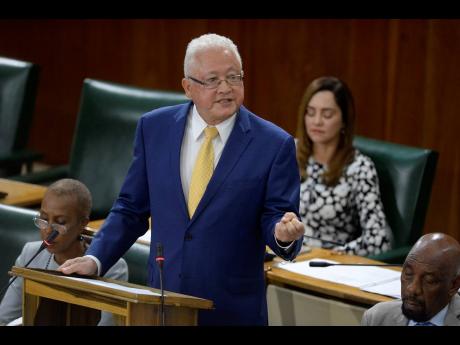Letter of the Day | Supreme Court not ready for certain gang matters
THE EDITOR, Madam:
I strongly espouse the view of Justice Minister Delroy Chuck that gang trials are posing serious challenges to the courts, primarily that of security and logistics. Some of these matters consist of multiple defendants, some as large as 50, and the Supreme Court is not yet resourced to accommodate matters of this magnitude. There is no dock at the Supreme Court that can hold 20 or more accused persons, nor is there sufficient seating for attorneys representing the said number of accused persons.
These trials will, in the long-run, have dire implications on the resources of the security forces, to commute and police these accused daily from their various detention centres, so that they are before the court at 10 a.m. to avoid unnecessary adjournments and delays.
Alternative arrangements are therefore pivotal, especially if more of these matters are likely to go before the court, even in greater numbers.
The thought of having some of these trials at Up Park Camp is clearly forward-thinking, and in no doubt will spare the State’s resources, as some of these trials may last for up to a year, depending on the number of accused being tried.
BENEFITS OF UP PARK CAMP
An Up Park Camp trial court would reduce the use of the Special Measures Act, which allows vulnerable crown civilian witnesses to testify from an off-site location owing to fear and security concerns. Thereby reducing the need of decentralising resources, such as an independent counsel and other court staff to observe and man the witness while he or she gives evidence.
However, it must be borne in mind that attorneys involved in these cases will not have the advantage that currently obtains, to step out of court for five or 10 minutes to either mention or adjourn a matter in another court. Thus forcing him or her to commit his practice solely to the matter being tried, even if it takes two years. Some, if not most, of these accused are unable to afford a legal representation for the duration of the trial, and rely on legal aid for their lawyers. What this means is that more resources have to be allocated to the Legal Aid Council.
Quite frankly, it is my view that the Ministry of Justice sometimes takes for granted the provision of resources to lawyers on legal aid assignments, primarily printed materials and timely payouts for work done, as is the case for other legal aid matters.
The approach going forward cannot be the same and has to be more than lip service or coffee-table talks. The Ministry of National Security cannot on one hand make the case that there is a spike in robberies because criminals are trying to secure legal fees, and the Ministry of Justice, on the other hand , not providing adequate financial and material resources for accused relying on the legal aid assistance. There has to be a balance.
AMEND THE ACT
Additionally, Section 17 of the Criminal Justice (Suppression of Criminal Organisation) Act, which allows for gang trials to be tried by a single Judge without a jury, should be amended to allow up to three judges to hear and determine the fate of accused in an alleged gang of 20 or more accused persons.
Asking a single judge to sit, listen and dissect the evidence of 30 or more accused for sometimes as long as over six months (my prediction) is way too onerous and may not be the most prudent or fairest principle. Unless it is that these cases are going to be divided in smaller and manageable sizes of no more than 15 to a judge. Judges are human beings and should not be expected to do more than what is reasonably practicable.
I commend the minister for thinking along his current trajectory and urge him to further examine the views raised herein.
ALEXANDER SHAW
Attorney-at-law

